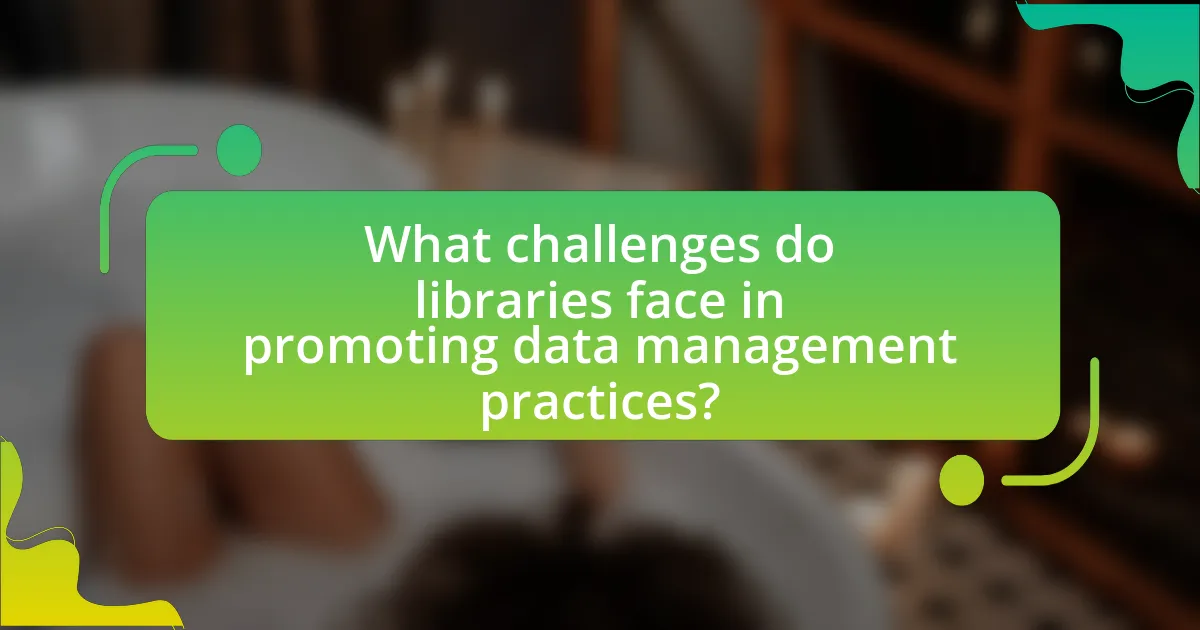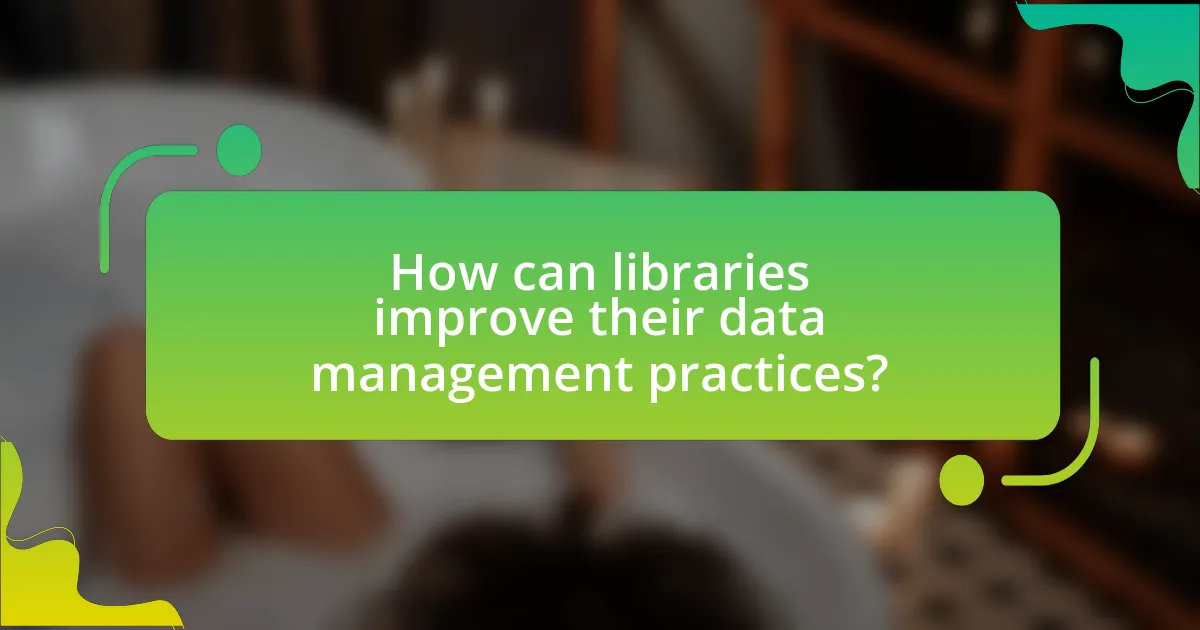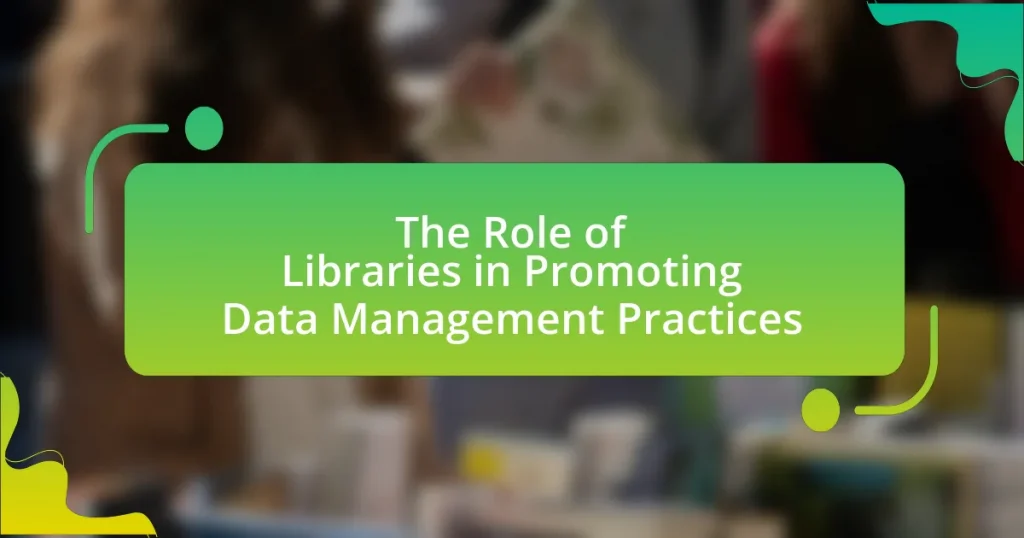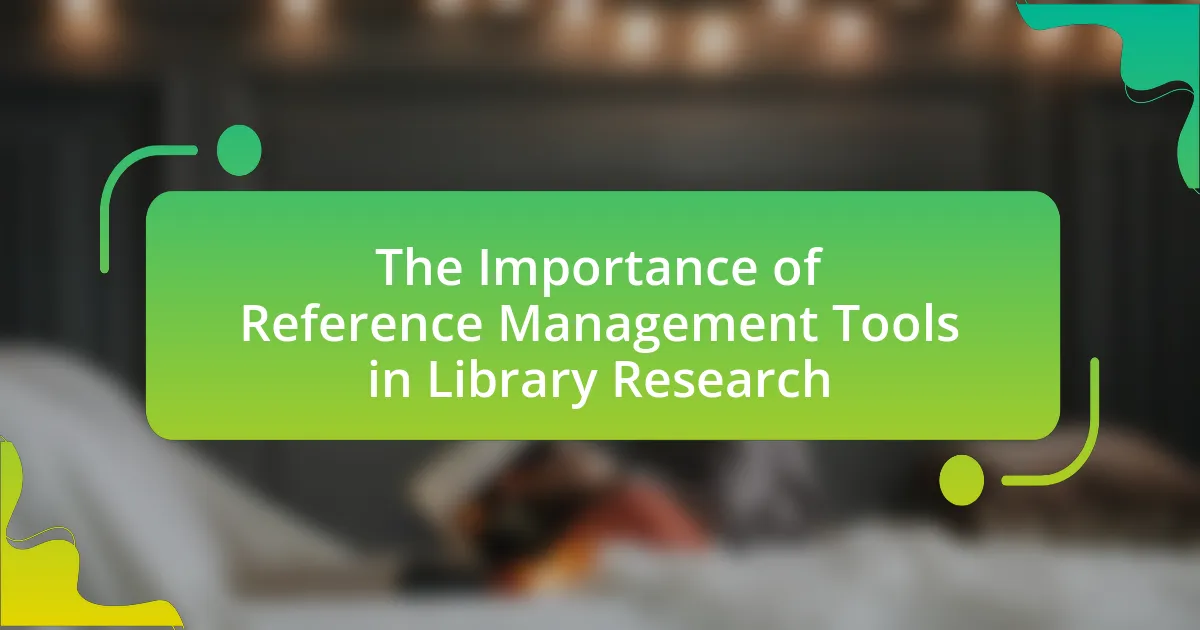Libraries play a vital role in promoting effective data management practices by providing essential resources, training, and support for data stewardship. They offer guidance on best practices for data organization, storage, and sharing, which enhances data accessibility and usability. Libraries also facilitate data literacy through workshops and training programs, ensuring users understand data management principles. Additionally, they contribute to data preservation and access by implementing systematic archiving practices and collaborating with academic institutions to create repositories. Despite facing challenges such as limited resources and varying user awareness, libraries continue to enhance their data management capabilities through technology integration and community engagement initiatives.

What is the role of libraries in promoting data management practices?
Libraries play a crucial role in promoting data management practices by providing resources, training, and support for effective data stewardship. They offer guidance on best practices for data organization, storage, and sharing, which enhances the accessibility and usability of data. For instance, many libraries have developed data management plans and workshops that educate researchers on compliance with funding agency requirements, such as the National Institutes of Health’s data sharing policies. Additionally, libraries often collaborate with academic institutions to create institutional repositories, ensuring that valuable research data is preserved and made available for future use. This support not only fosters a culture of responsible data management but also contributes to the advancement of knowledge across various fields.
How do libraries support data management initiatives?
Libraries support data management initiatives by providing resources, training, and infrastructure that facilitate effective data stewardship. They offer access to data management tools, such as data repositories and software for data analysis, which help researchers organize and share their data. Additionally, libraries conduct workshops and training sessions on best practices for data management, ensuring that users understand how to properly handle and preserve their data. According to the Association of College and Research Libraries, libraries play a crucial role in promoting data literacy, which is essential for effective data management.
What resources do libraries provide for data management?
Libraries provide a variety of resources for data management, including data management planning tools, training workshops, and access to data repositories. These resources assist researchers and institutions in organizing, storing, and sharing their data effectively. For instance, many libraries offer templates for data management plans that align with funding agency requirements, ensuring compliance and enhancing the quality of research outputs. Additionally, libraries often provide workshops on best practices for data organization and sharing, which are essential for maintaining data integrity and accessibility. Access to institutional repositories allows researchers to deposit their data securely, facilitating long-term preservation and discoverability.
How do libraries facilitate data literacy among users?
Libraries facilitate data literacy among users by providing access to resources, training programs, and workshops focused on data management and analysis. They offer tools such as databases, software, and instructional materials that help users understand data concepts and practices. For instance, many libraries conduct workshops on data visualization, statistical analysis, and data ethics, which enhance users’ ability to interpret and utilize data effectively. Additionally, libraries often collaborate with educational institutions to develop curricula that promote data literacy, ensuring that users are equipped with the necessary skills to navigate the data-driven landscape.
Why are libraries essential for effective data management?
Libraries are essential for effective data management because they provide structured access to information, promote data literacy, and ensure the preservation of data. By organizing resources and offering tools for data retrieval, libraries facilitate efficient data management practices. Furthermore, libraries often host workshops and training sessions that enhance users’ understanding of data management principles, which is crucial in an era where data-driven decision-making is prevalent. According to the American Library Association, libraries play a pivotal role in fostering information literacy, which directly impacts the ability to manage data effectively.
What unique advantages do libraries offer in data management?
Libraries offer unique advantages in data management by providing structured access to information, expert guidance, and preservation services. They facilitate organized data storage and retrieval through established cataloging systems, ensuring users can efficiently locate and utilize resources. Additionally, librarians possess specialized skills in data curation and management, helping users navigate complex datasets and implement best practices. Libraries also play a crucial role in preserving data integrity and longevity through archiving services, which safeguard valuable information against loss or degradation. These advantages are supported by the American Library Association’s emphasis on libraries as essential hubs for information literacy and data stewardship.
How do libraries contribute to data preservation and access?
Libraries contribute to data preservation and access by implementing systematic archiving practices and providing digital repositories. These institutions utilize established standards and protocols, such as the Open Archival Information System (OAIS) model, to ensure the long-term preservation of digital content. For instance, the Library of Congress has developed initiatives like the National Digital Stewardship Alliance, which promotes best practices in digital preservation. Additionally, libraries offer access to a wide range of datasets and research outputs through platforms like institutional repositories, enabling researchers and the public to retrieve valuable information efficiently. This dual role of preservation and access is critical in maintaining the integrity and availability of data for future generations.

What challenges do libraries face in promoting data management practices?
Libraries face several challenges in promoting data management practices, including limited resources, lack of staff expertise, and varying levels of awareness among users. Limited funding restricts libraries’ ability to develop comprehensive data management programs and acquire necessary tools. Additionally, many library staff may not possess the specialized knowledge required to effectively guide researchers in data management, which can hinder the implementation of best practices. Furthermore, users often have differing levels of understanding regarding data management, making it difficult for libraries to tailor their support and outreach efforts effectively. These challenges collectively impede libraries’ ability to foster robust data management practices within their communities.
How do funding and resource limitations impact libraries’ data management efforts?
Funding and resource limitations significantly hinder libraries’ data management efforts by restricting their ability to acquire necessary technology, hire skilled personnel, and provide adequate training. For instance, a study by the American Library Association found that 60% of libraries reported insufficient funding as a barrier to implementing effective data management systems. This lack of financial support leads to outdated infrastructure and limited access to advanced data management tools, which are essential for organizing, preserving, and sharing data effectively. Consequently, libraries struggle to meet the growing demands for data services, ultimately affecting their role in promoting best practices in data management.
What strategies can libraries employ to overcome funding challenges?
Libraries can employ diverse strategies to overcome funding challenges, including diversifying funding sources, enhancing community engagement, and demonstrating value through data-driven outcomes. By seeking grants from government agencies, private foundations, and corporate sponsorships, libraries can reduce reliance on traditional funding streams. Engaging the community through events, partnerships, and outreach programs can foster local support and increase donations. Additionally, libraries can utilize metrics and success stories to showcase their impact, thereby justifying funding requests and attracting new financial support. For instance, a study by the American Library Association found that libraries demonstrating clear community benefits are more likely to secure funding.
How can libraries enhance their data management capabilities despite limitations?
Libraries can enhance their data management capabilities by adopting cloud-based solutions and implementing standardized metadata practices. Cloud-based solutions allow libraries to store and manage large datasets efficiently, overcoming physical storage limitations. For instance, the use of platforms like Amazon Web Services or Google Cloud enables scalable data storage and access, facilitating collaboration and data sharing among users. Additionally, standardized metadata practices, such as adopting the Dublin Core or Data Documentation Initiative (DDI) standards, improve data discoverability and interoperability, making it easier for users to find and utilize data effectively. These strategies have been shown to increase the efficiency of data management in libraries, as evidenced by case studies demonstrating improved user engagement and data retrieval times.
What role does technology play in libraries’ data management practices?
Technology plays a crucial role in libraries’ data management practices by enabling efficient organization, storage, and retrieval of information. Libraries utilize integrated library systems (ILS) and digital asset management systems to streamline cataloging and enhance user access to resources. For instance, the implementation of cloud-based solutions allows libraries to manage large datasets and facilitate remote access, improving collaboration and resource sharing among institutions. Additionally, technologies such as data analytics tools help libraries assess usage patterns and optimize collections based on user needs, thereby enhancing service delivery.
How do libraries integrate new technologies for data management?
Libraries integrate new technologies for data management by adopting systems such as integrated library systems (ILS), digital asset management systems, and cloud-based solutions. These technologies streamline cataloging, enhance data accessibility, and improve user engagement. For instance, many libraries utilize ILS to manage collections efficiently, allowing for real-time updates and better tracking of resources. Additionally, the adoption of cloud-based platforms enables libraries to store and share data securely, facilitating collaboration and access to information across various locations. This integration is supported by studies showing that libraries that implement advanced data management technologies experience increased operational efficiency and improved user satisfaction.
What are the implications of emerging technologies for library data services?
Emerging technologies significantly enhance library data services by improving data accessibility, management, and analysis. Libraries can leverage cloud computing to store vast amounts of data securely and facilitate remote access, allowing users to retrieve information from anywhere. Additionally, the integration of artificial intelligence and machine learning enables libraries to automate data processing, providing personalized recommendations and improving user experience. For instance, a study by the American Library Association highlights that libraries utilizing AI-driven tools have seen a 30% increase in user engagement due to tailored content delivery. Furthermore, the adoption of blockchain technology can enhance data integrity and security, ensuring that sensitive information remains protected while maintaining transparency in data transactions. These advancements collectively position libraries as pivotal players in the evolving landscape of data management practices.

How can libraries improve their data management practices?
Libraries can improve their data management practices by implementing standardized metadata schemas and adopting robust data management systems. Standardized metadata schemas, such as Dublin Core or MARC, enhance data consistency and interoperability, allowing for easier data sharing and retrieval. Additionally, adopting data management systems like Integrated Library Systems (ILS) or cloud-based solutions can streamline data organization, storage, and access. According to a study by the Association of College and Research Libraries, effective data management practices lead to increased efficiency and improved user satisfaction in library services.
What best practices should libraries adopt for effective data management?
Libraries should adopt best practices such as implementing standardized data formats, ensuring data security, and providing staff training for effective data management. Standardized data formats facilitate interoperability and data sharing, which is crucial for collaboration among libraries and researchers. Ensuring data security protects sensitive information and maintains user trust, while staff training equips library personnel with the necessary skills to manage and curate data effectively. According to the American Library Association, these practices enhance the overall quality and accessibility of data, thereby supporting the mission of libraries in promoting informed decision-making and research.
How can libraries develop training programs for staff and users?
Libraries can develop training programs for staff and users by assessing their specific needs and creating tailored content that addresses those needs. This involves conducting surveys or focus groups to identify knowledge gaps and preferred learning methods. For instance, a study by the American Library Association found that targeted training significantly improves staff competency in data management practices. Libraries can then design workshops, online courses, and hands-on training sessions that incorporate real-world scenarios relevant to their community. Additionally, collaborating with local educational institutions can enhance the quality and reach of these programs, ensuring they are up-to-date with current data management trends and technologies.
What partnerships can libraries form to enhance data management services?
Libraries can enhance data management services by forming partnerships with academic institutions, technology companies, and data repositories. Collaborating with academic institutions allows libraries to align their services with research needs, providing tailored support for data management plans and compliance with funding agency requirements. Partnering with technology companies can facilitate access to advanced data management tools and training, improving the library’s technological capabilities. Additionally, working with data repositories enables libraries to offer researchers secure storage solutions and ensure long-term data preservation. These partnerships collectively strengthen libraries’ roles in promoting effective data management practices.
What practical steps can libraries take to promote data management awareness?
Libraries can promote data management awareness by offering targeted workshops and training sessions on data management best practices. These educational initiatives can cover topics such as data organization, metadata creation, and data sharing policies. For instance, the Association of College and Research Libraries (ACRL) emphasizes the importance of information literacy, which includes data management skills, in their Framework for Information Literacy for Higher Education. Additionally, libraries can create online resources and guides that provide easy access to data management tools and templates, thereby enhancing user engagement and understanding. By collaborating with academic departments and research offices, libraries can tailor their offerings to meet specific needs, ensuring that researchers and students are equipped with the necessary skills to manage their data effectively.
How can libraries engage their communities in data management initiatives?
Libraries can engage their communities in data management initiatives by offering workshops and training sessions that focus on data literacy and management skills. These programs can help community members understand the importance of data organization, preservation, and sharing. For instance, a study by the American Library Association found that libraries that provide hands-on training in data management tools significantly increase community participation and knowledge retention. Additionally, libraries can collaborate with local organizations to create data-sharing platforms that encourage community members to contribute and access valuable data resources, fostering a sense of ownership and collaboration within the community.
What resources are available for libraries to improve data management practices?
Libraries can access various resources to enhance data management practices, including specialized training programs, software tools, and collaborative networks. Training programs, such as those offered by the Association of College and Research Libraries (ACRL), provide librarians with essential skills in data curation and management. Software tools like DSpace and Dataverse facilitate the organization and sharing of research data, while collaborative networks, such as the Digital Library Federation (DLF), allow libraries to share best practices and resources. These resources collectively support libraries in developing robust data management strategies, ensuring compliance with data sharing policies, and improving overall data stewardship.






